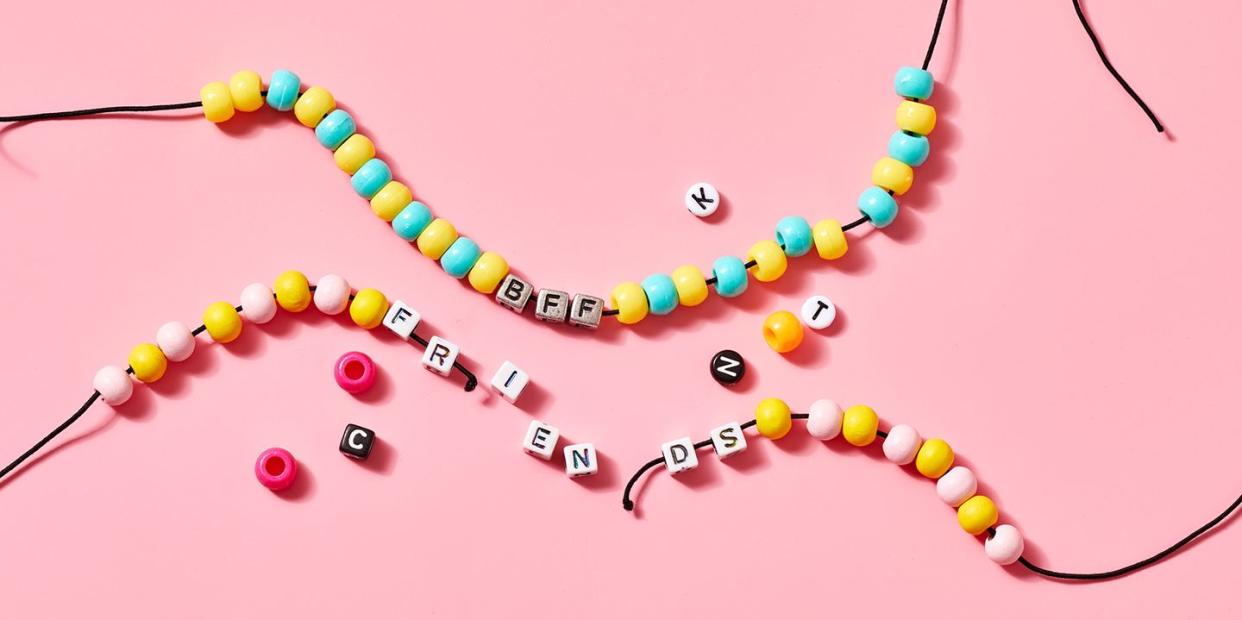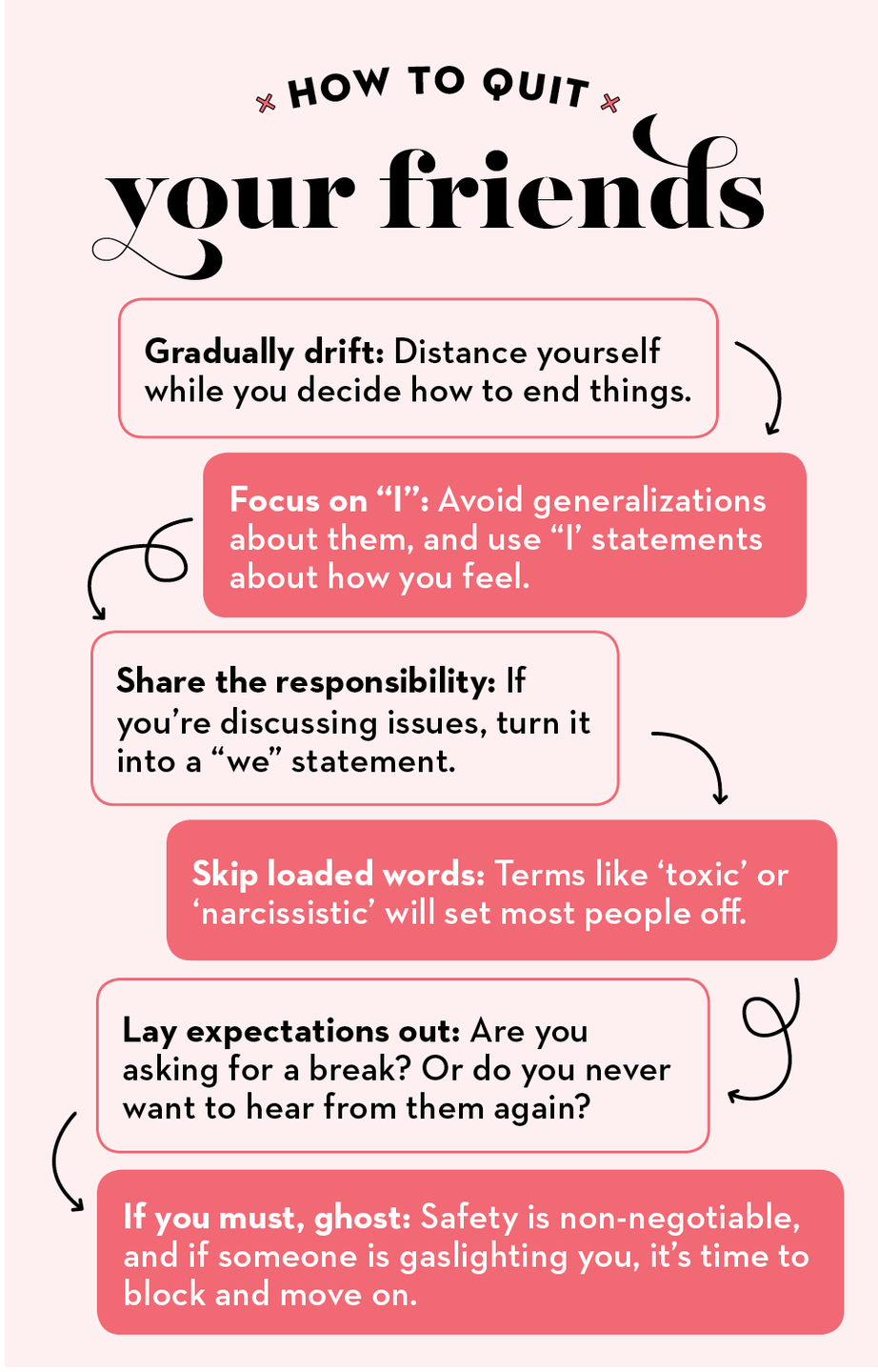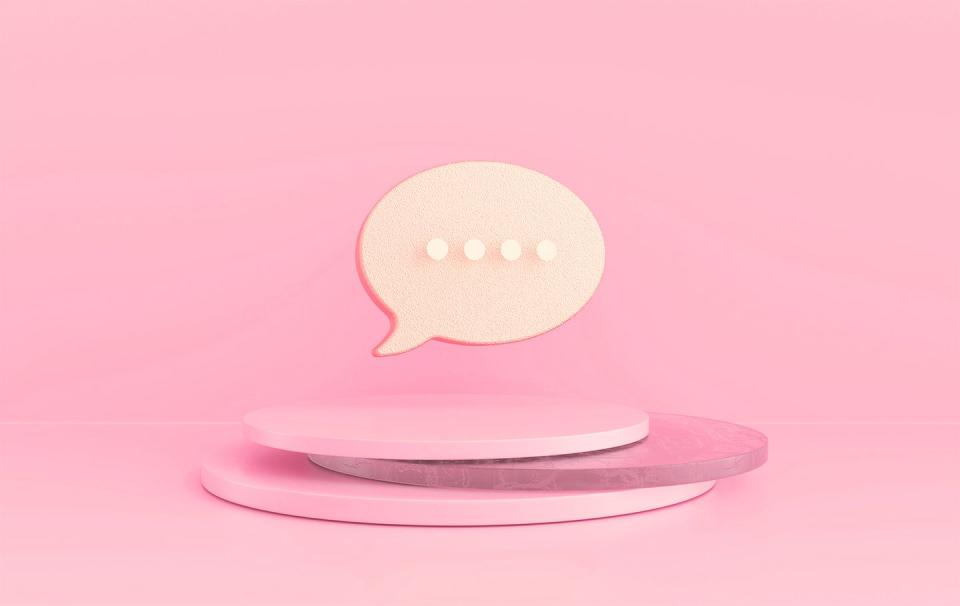You're Ready to Break Up with a Toxic Friend. Now What?

The chaos of the pandemic made falling out of touch natural — even acceptable. That was kind of handy when it came to an acquaintance that, for whatever reason, you don't have room for in your life.
But breaking up with a once-close friend is not that easy. Cutting ties with a deeper connection is much harder, given that everyone is following everyone on social media — never mind that they may be able to see who you're reimbursing for beers on Venmo. If you work or share a living space with the person you'd like some distance from, that can be even harder.
And severing a friendship can be so much more painful than ending a romantic relationship. With a partner, you expect there to be intense feelings, but friends can pack in a surprising amount of emotional baggage you didn't even notice they were carrying around, explains Fran Walfish, Psy.D., a California-based psychotherapist and author appearing on CBS's The Doctors and WEtv. It may feel easier to ghost them to avoid confrontation — and in some cases, that's what you'll need to do.
But way more often than not, ending a friendship requires an approach that stresses compassion for the friend you once held dear, compassion for your own feelings, and firm resolution to help you both move forward. "I do believe it helps tremendously to have an understanding of what went wrong. It's a learning opportunity to grow and use the information in a positive way for the next relationship, and enhance self-awareness," Walfish adds.

Should you end your friendship?
Sometimes, the reason you need to end the friendship is a no-brainer, says Brittany Johnson, LMHC, an Indiana-based trauma-focused therapist and author of Get Out of Your Own Way. Johnson reports being booked solid since the pandemic began helping clients work through revelations that left them feeling that they didn't know their friend at all, or that they didn't share the same values. Many breakups were brought on by being shocked to discover very different takes on current events, such as social unrest around racial injustice, police brutality, or politics around the 2020 election; more was about the science behind the spread of COVID-19 and dealing with lockdown.
But other times, says Johnson, the problem with your friend is less black-and-white, and doing the legwork to be certain you want to end the friendship can save you a lot of grief. Even if you are pretty sure you don’t want this friend in your life, the best way to end a friendship is actually to try to preserve it at first.
That’s because communicating why you are angry or disappointed in a friend has several benefits: Expressing yourself can ensure your friend knows how you feel, Johnson says, so they can't claim to be surprised. It also allows you to feel at peace when with your decision if your concerns aren't resolved after you bring them up, and gives your friend a chance to apologize and perhaps be there for you in the way you need, says Johnson. There's nothing worse for your own emotional wellbeing than forcing a relationship to end and realizing later that you've made a mistake.
When it's time to end your friendship
Unfortunately, after an initial heart-to-heart, it quite often becomes clear that the friendship isn't working, and that it's in your best interest to end it entirely. What kinds of situations warrant this response? According to Good Housekeeping's panel of psychologists and therapists, these are red flags that you simply can't ignore:
The friend is flouting clear boundaries, even after you've asked them to honor them, repeatedly showing up in places you don't wish to see them, or broaching a topic of conversation that's off-limits.
They're lying to you or consistently breaking your trust, are no longer rooting for you, or have become your rival.
They've steered onto a one-way street — it's all about them, and you are devoting way more time, effort, and resources to the friendship than you're getting from it.
They're consistently negative and tarnish your mood, or you feel an obligation to be friends with no real connection in this case.
Their values no longer align with yours, and you can't find a middle ground. "If you are having to hide things that are important to you, that's a sign [the relationship] may be toxic and not helpful anymore," says Jen Douglas, Ph.D., a clinical assistant professor at Stanford University's School of Medicine and a practicing psychologist in the San Francisco Bay area. "Just as many of us will draw a line in the sand on where we will work due to a company's values, we deserve to have similar thoughts in regards to values held by friends who we associate with."
They're gaslighting you, especially over issues of identity or sexual experience. If they're invalidating your feelings about being queer, for example, refusing to accept who you are while minimizing every experience you share, it's time to move on.
It's an extreme situation involving abuse. In that case — which we'll get to later —you'll need more immediate distance.
Assuming it's any of the reasons above aside from an abusive situation, however, what should you do next?

Should I end it over text?
The short answer here is no, and there are some other don’ts: Don’t ask another friend to deliver the message that you won't be speaking to them again, nor should you rant about them on social media, or be destructive in some other way.
So what should you do? Start by gradually distancing yourself from the friend in question, experts say. This gives you time to make sure you're ready to discuss things without spilling out pent-up anger or frustration, says Johnson. Acting too fast is generally turns "the talk" into "the screaming match."
Next, decide if you want to have a face-to-face or spell it out in a letter, advises Jen Polite, PhDc, LMHC, MS, a New York-based psychotherapist. Part of this is getting real about your expectations, she says. "What's your objective? The objective is imperative because you want to ensure that you're not having a conversation in hopes that they'll give you something, like closure, explanations, or clarity," Polite says. "Though ideal, this type of outcome isn't within your control — your objective should be centered on what you alone can control, and you should only schedule a live conversation if sharing how you feel is the most important thing on your agenda."
And you’re not a wimp if you decide not to have "the talk," says Johnson. "If it's not your strong suit, it'll be counterintuitive to try to force yourself to have a face-to-face conversation," Johnson explains. In this case, you'll work to express your feelings in a note.
When a written breakup may be best:
A written goodbye can help you end things peacefully in many ways, chiefly among them that you'll avoid a confrontational scene.
You can express yourself calmly and clearly, without getting flustered. "If you have felt invalidated by the person but know that you will regret not expressing yourself, [writing a letter] can help to assertively communicate why the friendship isn't working for you," explains Douglas.
You can take your time. "When approaching emotionally difficult subjects, it is important to think through what you would like to get across ahead of time," says Douglas. You may want to write a draft in a journal first, suggests Tasha M. Brown, Ph.D., a New York-based clinical psychologist specializing in youth therapy. "If you need to get your thoughts out and organized, you can journal first, or even dictate what you want to say to another friend," she says.
It can feel safer. If a friend has been physically or verbally violent, you likely don't owe them a goodbye to begin with. But if you feel you must, a letter is the way to go.
When conversations may be better:
Some people find it easier to face a friend and declare their feelings, allowing someone a chance to respond and see genuine emotions. You'll want to select a neutral setting to have this conversation — somewhere that isn't on anyone's "turf" so to speak, and quasi-public if possible, to keep both you and the friend from making a scene.
You'd like to gauge their reaction. A real-time conversation can give your friend a chance to respond, and can help you see if they understand the point you're trying to get across, which can make things feel more settled. Ultimately, talking in person can give you a chance to be gracious and remind them that you are also sorry this relationship didn't work out.
If you think it will be helpful to your friend. Having a conversation in person may give your soon-to-be-former friend a chance to resolve their feelings. "You should aim to listen as much as you speak," Polite says. They can weigh in on how they feel about ending your friendship in a calm and constructive manner; if it becomes explosive or overly emotional, that's your cue to transition into next steps (or, just to leave).
You can talk through boundaries. The goal of this conversation should include setting boundaries you're going to need them to uphold moving forward," Brown adds. Your friend might have boundaries of their own — ending a friendship respectfully means you will want to understand theirs as well.
Master tactics for breaking it off:
Regardless if you're doing it in person or via snail mail, employing these strategies when ending a friendship will result in the healthiest possible resolution for both parties.
Make it about how you're feeling. Most people respond better to "I" language when you are affirming your emotions. Framing what your friend did or didn't do in terms of how it made you feel will also help you avoid incendiary language or accusations that'll prompt defensive digs, Polite says. "It's important to stick to giving feedback on behaviors — statements like 'It's really bothered me how you've put down my partner even after I've asked you to stop' — versus making general statements about their character, like 'You're a terrible person,'" Douglas explains.
Share responsibility. "Saying something like 'We can't seem to find a middle ground' can be better received than 'You aren't doing what you should be,' because it doesn't indicate they're wrong alone," says Johnson. Yes, even if you feel in your heart that they alone are at fault — your goal here is to end things gracefully, and blaming them won't help with that.
Keep the conversation neutral, and skip loaded language. Even if the person begins throwing blame or insults your way, continue to respond by focusing on your feelings, and don't engage in any low blows. "Stay away from the word 'toxic' in the entire conversation, because that word will set anyone off," Johnson stresses. "That's never productive for a good conversation."
Try to stay out of the weeds. "To engage in a back and forth conversation over small details is counterproductive, as you've already made a decision," Brown says. Use phrases like: "This has been my experience"; "This is how I feel"; "This is what I'm thinking," Johnson adds. If the conversation is going in circles, it's time to end it — you don't want to allow yourself to become gaslit in the process.
Lay your expectations out for moving forward. Be clear here — are you asking for time and space? Or do you wish to never hear from this person again? If you'll be seeing this person again in an office, a classroom, or another social setting, what kind of interactions are you hoping to have? Johnson says it's important to share what you hope for the future as plain as day to avoid confusion later on.
Wish them well. Showing that you have goodwill toward them may or may not be well received in the moment, but if it's sincere, it's worth doing. Later, looking back, they may appreciate that you're rooting for their future happiness.

When it's okay to mute or block someone — or simply ghost:
Some conflicts should prompt you to immediately block a friend on social media and remove yourself from any interaction: those that make you feel unsafe or targeted. Safety is non-negotiable, says Douglas. There are things you cannot simply agree to disagree over. "Issues such as social injustice, racism, and police brutality intersect with many individuals' personal experience and deeply held values," she says, and can make you feel emotionally unsafe around someone. If you don't share any other social circles and have no need for closure, you can ghost this person and sever communication without explanation. You don't owe them anything.
Another time ghosting or blocking may be appropriate: If they're actively gaslighting you, meaning they're erasing your human experience or opinions, says Douglas. The emotional labor of convincing someone to respect your feelings, or not be racist, homophobic, xenophobic or generally intolerant in any regard is not on you alone, and you can decide that it's too much for you. You don't need to bear the cross of mistreatment in a quest to correct a former friend's behavior, she adds. In other words, you can freely walk away from this person without closure or explaining why you're ending this friendship if it's too hard on you.
If the person is a threat to you or your health, it's crucial that you end your relationship immediately. If you know this person may have enough info to track you down, call 911 or local authorities and get help in handling the situation.
If you don't feel unsafe or gaslit, but just don't want to deal, muting a former friend is a good choice. This option (or the unfollow function on Facebook) wipes their content and activity off your feed — and they will be none the wiser. It's an easy digital fix that can save you a lot of internalized drama.
Once the deed is done:
Despite how sure you are you needed to quit your friend, you'll likely feel extremely sad. "You should expect upfront that there will be some grieving, especially if this person had any hand in major milestones in your life," Brown explains. You may even doubt your decision for a short while, which is only natural. "Having your pros and cons list [from before], being able to confidently say why you ended the friendship is crucial here. In moments of sadness, you're able to remember why you made the decision."
Let It Go! Quitting These Habits and Obstacles Has Never Been Healthier
You Might Also Like

